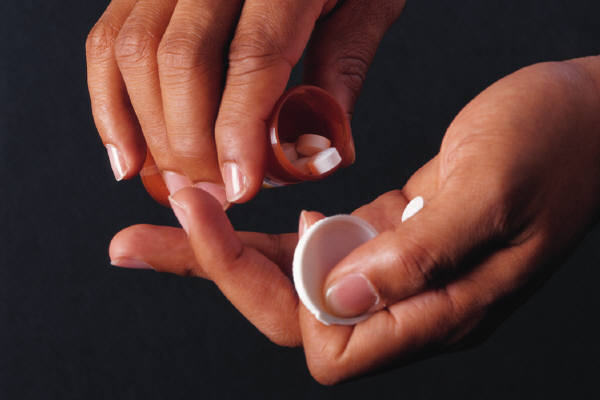Pain and depression make a dangerous pair. In fact, this combination can be downright deadly. But the reason may surprise you: Two common treatments could actually be to blame.
Non-steroidal anti-inflammatory drugs (NSAIDs) like ibuprofen or naproxen have already been targeted as a common cause of gastrointestinal bleeding due to their ability to erode your gut’s protective lining. But recent research shows that pairing NSAIDs with the most popular class of antidepressant drugs–called selective serotonin reuptake inhibitors, or SSRIs–can make a bad situation even worse.
In a recent analysis of medical studies on this link, researchers found that 67 percent of upper gastrointestinal bleeding cases occurred in patients taking both NSAIDs and SSRIs, after a median of only 25 weeks of use.1 Another recent study indicated that patients using both types of drugs suffered a ninefold increase in gastrointestinal bleeding risk when compared with controls.2
The conclusion: When combined with SSRIs, even aspirin can significantly increase your risk of a condition that can cause anything from severe anemia to death.3
Fortunately, you don’t have to suffer through depression or chronic pain to avoid this risk. In fact, by taking steps to strengthen your gastrointestinal lining and combat pain naturally, you can have the best of both worlds without sacrificing your health in the process.
GI Cell Support is one good example of a supplement that contains multiple nutrients for gastrointestinal health–including amino acids like glutamine and N-acetyl-glucosamine, essential for both reinforcing your intestine’s mucosal wall and ensuring healthy GI cell metabolism.4-6 Botanicals such as deglycyrrhizinated licorice (DGL), marshmallow leaf and root, slippery elm, and cabbage are also helpful in maintaining gut health, due to their ability to soothe irritation, stimulate mucous production, and promote ulcerative healing.7-11 Berberine is another crucial component, most notably for its ability to inhibit cyclooxygenase (COX)-2 expression–thereby providing you with safe and natural GI support.12
Other safe options for reducing chronic pain are numerous–but the most effective include the herbs turmeric and boswellia serrata, both of which have been proven to inhibit joint inflammation and destruction in animal studies and placebo-controlled human trials.13-14 DL- phenylalanine is another powerful natural compound, with demonstrated clinical effectiveness against chronic pain.15-16 Back in Action™ combines these ingredients along with several others for a powerful synergistic effect–one that comes at no cost to your lasting health.
References:
1. Loke YK, Trivedi AN, Singh S. Meta-analysis: gastrointestinal bleeding due to interaction between selective serotonin uptake inhibitors and non-steroidal anti-inflammatory drugs. Aliment Pharmacol Ther. 2008 Jan 1;27(1):31-40.
2. de Abajo FJ, García-Rodríguez LA. Risk of Upper Gastrointestinal Tract Bleeding Associated With Selective Serotonin Reuptake Inhibitors and Venlafaxine Therapy. Interaction With Nonsteroidal Anti-inflammatory Drugs and Effect of Acid-Suppressing Agents. Arch Gen Psychiatry. 2008;65(7):795-803.
3. Dalton SO, Johansen C, Mellemkjaer L, Nørgård B, Sørensen HT, Olsen JH. Use of selective serotonin reuptake inhibitors and risk of upper gastrointestinal tract bleeding: a population-based cohort study. Arch Intern Med. 2003 Jan 13;163(1):59-64.
4. Sacks GS. Glutamine supplementation in catabolic patients. Ann Pharmacother. 1999;33:348-54.
5. Miller AL. Therapeutic considerations of L-glutamine: a review of the literature. Altern Med Rev. 1999;4:239-48.
6. Burton AF, Anderson FH. Decreased incorporation of 14C-glucosamine relative to 3H-N-acetyl glucosamine in the intestinal mucosa of patients with inflammatory bowel disease. Am J Gastroenterol. 1983;78:19-22.
7. van Marle J, Aarsen PN, Lind A, van Weeren-Kramer J. Deglycyrrhizinised liquorice (DGL) and the renewal of rat stomach epithelium. Eur J Pharmacol. 1981;72:219-25.
8. Tewari SN, Wilson AK. Deglycyrrhizinated liquorice in duodenal ulcer. Practitioner. 1973;210:820-3.
9. Newall CA, Anderson LA, Philpson JD. Herbal Medicine: A Guide for Healthcare Professionals. London, UK: The Pharmaceutical Press, 1996.
10. Cheney G. Vitamin U Therapy of Peptic Ulcer. California Medicine. 1952;77(4): 248-252.
11. Gruenwald J, Brendler T, Jaenicke C. PDR for Herbal Medicines. 1st ed. Montvale, NJ: Medical Economics Company, Inc., 1998.
12. Fukuda K, Hibiya Y, Mutoh M, et al. Inhibition by berberine of cyclooxygenase-2 transcriptional activity in human colon cancer cells. J Ethnopharmacol. 1999;66:227-33.
13. Funk JL, Frye JB, Oyarzo JN, et al. Efficacy and mechanism of action of turmeric supplements in the treatment of experimental arthritis. Arthritis Rheum. 2006 Nov;54(11):3452-3464.
14. Kimmatkar N, Thawani V, Hingorani L, et al. Efficacy and tolerability of Boswellia serrata extract in treatment of osteoarthritis of knee–a randomized double blind placebo controlled trial. Phytomedicine. 2003 Jan;10(1):3-7.
15. Ehrenpreis S. Pharmacology of enkephalinase inhibitors: animal and human studies. Acupunct Electrother Res. 1985;10(3):203-208.
16. Walsh NE, Ramamurthy S, Schoenfeld L, et al. Analgesic effectiveness of D-phenylalanine in chronic pain patients. Arch Phys Med Rehabil. 1986 Jul;67(7):436-439.


